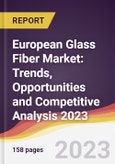A total of 64 figures /charts and 46 tables are provided in this 158-page report to help in your business decisions.
European Glass Fiber Market
In this market, transportation is the largest end use industry of European Ggass Ffber, E (ECR)- glass is largest in product type. Growth in various segments of the European glass fiber market are given below:
The study includes the European glass fiber market size and forecast for the global glass fiber market through 2028, segmented by product type, application, and region, as follows:
European Glass Fiber Market by Application Type (million pounds and $ million shipment analysis from 2017 to 2028):
- Transportation
- Construction
- Electrical and Electronics
- Pipe & Tank
- Wind Energy
- Consumer Goods
- Marine
- Aerospace
- Others
- Hand lay up
- Spray up
- Resin infusion
- Pultrusion
- Injection molding
- Compression molding
- Prepreg lay up
- Others
- Single end roving
- Multi end roving
- Woven roving
- Fabrics
- CSM
- CFM
- DUCS
- CS
- Others
- North America
- Europe
- Asia Pacific
- The Rest of the World
- Germany
- France
- Italy
- Spain
- UK
- Others
On the basis of its comprehensive research, The analyst forecasts that E (ECR) glass is expected to be the largest product type of glass fiber by value and volume over the forecast period.
Within the European glass fiber market, transportation is expected to remain the largest and witness the highest growth market by value and volume consumption. Government regulations, such as carbon emission targets in Europe, are putting pressure on OEMs to incorporate lightweight materials to curb the overall vehicle weight, and this is the key driver for glass fiber in the transportation industry.
Some of the features of this report:
- Market Size Estimates: European glass fiber market size estimation in terms of value ($M) and volume (Million Pounds) shipment.
- Trend And Forecast Analysis: Market trend (2017-2022) and forecast (2023-2028) by application, and end use industry.
- Segmentation Analysis:European glass fiber market size by various applications such as application, manufacturing process, product, and country in terms of value and volume shipment.
- Growth Opportunities:Analysis on growth opportunities in different applications and regions of glass fiber in the European glass fiber market.
- Strategic Analysis:This includes M&A, new product development, and competitive landscape of glass fiber in the European glass fiber market.
- Analysis of competitive intensity of the industry based on Porter’s Five Forces model.
This report answers the following 11 key questions:
Q. 1. What are some of the most promising, high-growth areas in the European glass fiber market by application (marine, transportation, pipe and tank, aerospace, construction, electrical and electronics, consumer goods, wind energy, and others), product type (single end roving, multi end roving, woven roving, fabrics, CSM, CFM, DUCS, and CS), manufacturing process (hand lay up, spray up, resin infusion, pultrusion, injection molding, compression molding, prepreg layups, and others), country (Germany, France, Italy, Spain, UK, Others) ?Q. 2.Which product segments will grow at a faster pace and why?
Q. 3.Which region will grow at a faster pace and why?
Q.4.What are the key factors affecting market dynamics? What are the drivers and challenges in the European glass fiber market?
Q.5.What are the business risks and competitive threats in this European glass fiber market?
Q.6.What are emerging trends in this European glass fiber market and the reasons behind them?
Q.7.What are some changing demands of customers in the European glass fiber market?
Q.8.What are the new developments in the European glass fiber market and which companies are leading these developments?
Q.9.Who are the major players in this European glass fiber market? What strategic initiatives are being implemented by key players for business growth?
Q.10. What are some of the competitive products in this European glass fiber market and how great of a threat do they pose for loss of market share through product substitution?
Q. 11. What M & A activities have transpired in the last 5 years in this European glass fiber market and how have they affected the industry?
This product will be delivered within 1-3 business days.
Table of Contents
Companies Mentioned
- Owens Corning
- Jushi Group Co., Ltd.
- 3B the Fiber Glass Company (Goa Glass fiber)
- Nippon Electric Glass Co., Ltd.
- LANXESS
- Johns Manville Corporation
Methodology
The analyst has been in the business of market research and management consulting since 2000 and has published over 600 market intelligence reports in various markets/applications and served over 1,000 clients worldwide. Each study is a culmination of four months of full-time effort performed by the analyst team. The analysts used the following sources for the creation and completion of this valuable report:
- In-depth interviews of the major players in the market
- Detailed secondary research from competitors’ financial statements and published data
- Extensive searches of published works, market, and database information pertaining to industry news, company press releases, and customer intentions
- A compilation of the experiences, judgments, and insights of professionals, who have analyzed and tracked the market over the years.
Extensive research and interviews are conducted in the supply chain of the market to estimate market share, market size, trends, drivers, challenges and forecasts.
Thus, the analyst compiles vast amounts of data from numerous sources, validates the integrity of that data, and performs a comprehensive analysis. The analyst then organizes the data, its findings, and insights into a concise report designed to support the strategic decision-making process.

LOADING...








